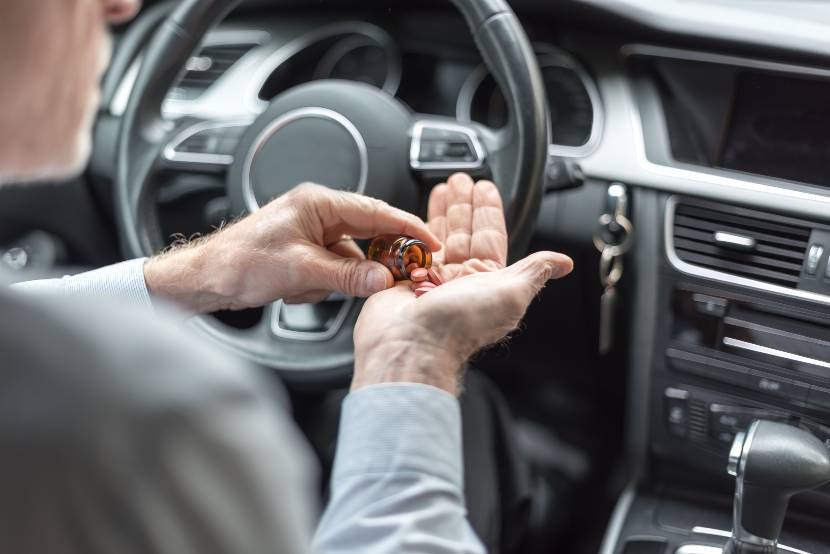The threshold for illegal drugs is set purposely low to enforce a zero-tolerance approach on drug driving. Certain prescription medications have limits too as they can affect your ability to drive.
Research from the charity Brake reveals that drug-driving is a factor in 1 in 20 fatal crashes. So why are people taking the risk?
We look at the consequences of drug driving, illegal drugs, medication, and drug-driving limits as well as drug-driving penalties.

What are the drug-driving limits for prescription and illegal drugs?
Here are the drug-driving limits for the 8 drugs that are most associated with illegal use. We've also inlcuded the limits for the 8 medicinal drugs that have the potential to impact on driver ability:
If you've any concerns about drugs consumption, visit Frank.
| 'Illegal' drugs | Threshold limit in microgrammes per litre of blood (UG/L) |
|---|---|
|
Benzoylecgonine (a substance associated with cocaine use)
|
50µg/L
|
|
Cocaine
|
10µg/L
|
|
Cannabis
|
2µg/L
|
|
Ketamine
|
20µg/L
|
|
Lysergic acid diethylamide (LSD)
|
1µg/L
|
|
Methylamphetamine (meth)
|
10µg/L
|
|
Methylenedioxymethamphetamine (MDMA)
|
10µg/L
|
|
6-monoacetylmorphine (heroin)
|
5µg/L
|
| 'Medicinal drugs' | Threshold limit in microgrammes per litre of blood (UG/L) |
|---|---|
|
Clonazepam
|
50 µg/L
|
|
Diazepam
|
550µg/L
|
|
Flunitrazepam
|
300µg/L
|
|
Lorazepam
|
100µg/L
|
|
Methadone
|
500µg/L
|
|
Morphine
|
80µg/L
|
|
Oxazepam
|
300µg/L
|
The threshold limit for amphetamine is higher at 250ug/L to reflect its medicinal use.
Prescription drugs and driving law
If you’ve been prescribed any of the drugs in the medicinal section of the table, speak to your doctor. You can usually drive after taking these medicines if you’ve been given advice by a healthcare professional. For more information visit GOV.UK.
Some hay fever medications, such as chlorphenamine, hydroxyzine and promethazine, are known to cause drowsiness as a side effect.
Therefore, you shouldn’t take this sort of medication, or any other that says ‘may cause drowsiness’, if you’re planning on driving.
Solicitor Advocate David Barton says to be mindful that any prescription medication should be taken as instructed, especially if you plan on driving:
"Driving with illegal drugs or when your driving is impaired by drugs of any kind is viewed seriously by police and courts. Drug-driving convictions bring an almost automatic disqualification for a minimum of 12 months.
"The same applies if you fail to take medication that you should - for example, insulin if you're diabetic."
If you feel any symptoms occurring, or your driving is impaired in any way - even when taking the correct amount, you shouldn't drive.
Can I drive if I've taken codeine?
According to the NHS you should not drive a car or ride a bike if codeine makes you sleepy. It can affect your vision and ability to concentrate and make decisions.
Remember its an offence to drive a car if your ability to drive safely is affected. If in doubt, don't drive.
How do different drugs affect my driving?
There are 3 main types of drugs that can have significant effects on your driving:
- Hallucinogens
- Stimulants
- Depressants
Drugs affect drivers in several different ways, some of the more minor effects include:
- Slower reactions
- Poor concentration
- Overconfidence
- Reduced inhibition
- Poor coordination
And of course, the effects could be serious and last for hours, even days.
Can the police stop and drug test you for no reason?
The police can stop any driver that they judge to be under the influence of drugs.
If stopped for drug-driving in the UK, you’re likely to be asked to complete a ‘field impairment assessment’. This usually involves being asked to walk in a straight line or counting while standing on one leg. They might check your pupils too.
Roadside drug testing kits might also be used, that can detect both cannabis and cocaine. These test a sample of your saliva and give results in a couple of minutes. Other drugs require a visit to the police station for a blood test.
What happens if I’m caught drug-driving?
If the police believe you’ve taken drugs and are unfit to drive, they’re likely to arrest you. You're then taken to a police station for further blood and urine tests.
To convict you under Section 4 of The Road Traffic Act 1988 (for driving while unfit through drugs), the police need to prove that your driving was impaired. If they can prove that you’ve exceeded the legal level for a certain drug (under section 5a), then it doesn’t matter whether your actual driving was impacted or not, as it's considered to be impaired anyway.
UK drug-driving penalties
If you’re convicted of drug-driving in the UK then you could get:
- A driving ban for up to 1 year
- An unlimited fine
- Up to 6 months in prison
- A criminal record
This is even for a drug-driving first offence in the UK. Convictions appear on your licence, that might affect your job if you drive for a living. You could also face much higher car insurance costs the next time you come to renew your policy. The average car insurance cost with a drug-driving conviction is £2,100* according to our data. But some insurers may refuse to offer cover at all.
Having a driving and/or drug conviction might also restrict your overseas travel. Some countries don’t allow access to people with drug offences on their record.
*Confused.com data. July 2022-June 2023. Comprehensive policies with a DG10 conviction (driving with a drug level above specified limit).

